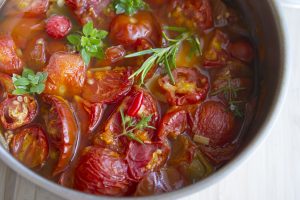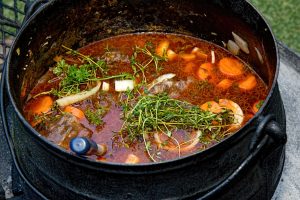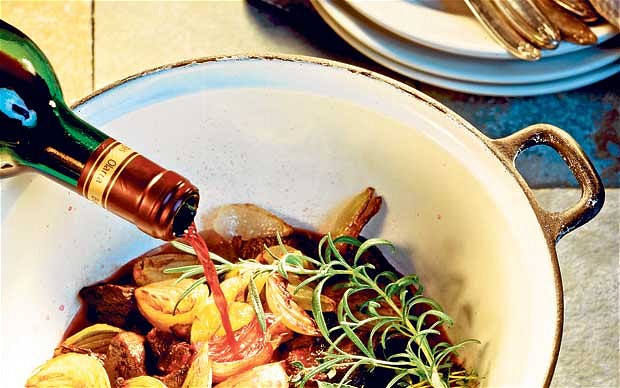Wine in food can definitely enhance the taste experience on everything from sauces and casseroles to soups and desserts. But how should you think regarding wine in cooking and what are the opportunities and pitfalls?
What wine especially contributes to in cooking is taste and a pleasant acid. The basic rule is, therefore, that rich and flavorful, as well as spicy and musty, red wines usually fit in food. When it comes to white wines, you should primarily choose dry wines and be even more careful with sweet alternatives that usually put too much impact on the food.
Whichever wine you choose, it is important that you reduce the liquid properly. In order to succeed in cooking, it is a condition that the alcohol is evaporated so that the food does not taste alcohol, and that the taste comes out properly.
If you do not want to reduce the wine in your casserole, you can do it in a saucepan next to it, preferably together with flavors such as stalk celery and various herbs.

Wine is not always the solution
– Before adding wine to the food, you should know what you want to achieve and what the wine really adds.
– It can hurt the taste when someone pours wine into the food for the sake of it. Often it can be something completely different from wine that is needed. And if you pour on wine, in the end, it can do more harm than good. If the alcohol is not reduced it may taste as if you accidentally spilled wine in the food.
Should you have the same wine in the food as in the glasses?
Since the wine acts as a taste bridge between food and drink, the wine in the food and the wine in the glass should have flavors that interact. It is especially important when it comes to dishes where the wine is added at the end, such as green pea soup where you pour champagne just before serving it.
If you are unsure, it is a safe bet to choose the same wine for the food as for the drink. A rule of thumb when it comes to red wine is that wines that contribute with healthy acids in the food can be difficult to match with more mature wines.
– After all, it is your taste that will determine. Dare to trust what you like yourself.
Which red wines are best for food?
– Many people prefer soft and sustainable wines when they cook, but generally, the more musty wines are very suitable for, for example, a long-time cook. The main tip is therefore to taste the wine. A lighter wine may not give a musty taste, but on the other hand, it may contribute a picky tone that, even if it was not the idea from the beginning, may fit really well in a pot.

Which white wines are best in food?
Dry and healthy wines fit in most sauces, soups or risotto. Tasty white wines such as sauvignon blanc, muscat, and Gewurztraminer take over easily, but can still work well in herbs that are flavored with herbs, as well as in lobster, mushroom and chicken soups.
– Think dry white wine – it brings out a freshness in taste that can be compared to lemon and vinegar.
What wines should you avoid in cooking?
It is often recommended that you avoid oak wines, that is, wines that have long been stored in oak barrels, as they have a reputation for taking over the flavors. But this is not always the case.
You can absolutely use oak wines, but they require more care so they do not take over the dish completely. Then the food can taste bitter from the oak barrel ageing.
– Even though they are spicy, it is not always very clear in the food.
– When it comes to white wine, beware of semi-dry and above all sweet wines … unless the goal is sweet food of course.
Strong wine in food
– Strong wines in food are rare today but underestimated. Just be careful about the dosing because the taste is strong.
– A drier sherry can also spice up many mushroom dishes, for example, dishes with forest mushrooms and certain mushrooms.
1. An opened wine bottle can last for a long time if you pump out the air using a vacuum pump and store it in the fridge. Then you can use the wine in the cooking even if the bottle has been open for a couple of weeks.
2. Avoid cooking wine or have it as a last resort.
3. Sweet wines, such as riesling, fit very well in the marinade. Alcohol speeds up the roasting process in the meat while the wine adds sweetness.
